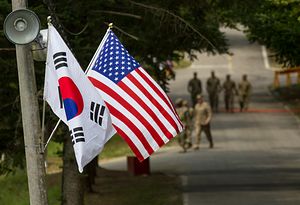The series of missile launches and a nuclear test North Korea has carried out in recent months have led to a heated discussion in South Korea’s political sphere on how to address these provocations. While the Moon administration is pushing for sending $8 million worth of humanitarian assistance to North Korea, many opponents are urging the government to bring back tactical nukes.
The whole debate on deploying these small-sized nuclear weapons — that can be as powerful as couple hundred kilotons — to the Korean theater began somewhat out of the blue when it was revealed that South Korean Minister of National Defense Song Yong-moo met with U.S. Secretary of Defense James Mattis on August 30 to talk about the issue of deploying tactical nukes in South Korea. Minister Song reconfirmed the discussion at the National Defense Committee when he revealed his “intention to review the redeployment of tactical nuclear weapons” to South Korea as one of the options to address North Korea’s provocations.
Song’s statement sparked controversy because it went directly against the Moon administration’s stated intentions. South Korean President Moon Jae-in made it clear in an interview with CNN on September 14 that he “disagrees with the idea of redeploying tactical nukes.” The government has since reined in Song from making any further comment on the matter.
However, the controversy expanded as Moon’s political opponents began to tap into the issue. The Liberty Party of Korea (LPK), the largest conservative opposition party, has expressed strong support for tactical nuclear weapons. The party even opened up a Special Committee on the North Korean Nuclear Crisis and sent six of its committee members to meet with U.S. government officials on September 15 to request sending tactical nukes to South Korea.
LKP representative Hong Joon-pyo has been criticizing the Moon administration, saying it is “nonsense to send 8 million dollars worth of assistance to North Korea when they are having fun making fireworks,” and “it is crucial to arm ourselves with nuclear weapons to protect our country and our nation.” At a national rally held in Daegu on September 15, he went as far as to say, “if we cannot get the United States to redeploy their tactical nukes, then let us develop nukes ourselves,” adding even further that “we can even leave the Nonproliferation Treaty (NPT) if we can arm ourselves with nukes.”
LKP’s recent actions spurred a strong response from the Minjoo Party of Korea (MPK), the ruling progressive party. MPK assemblyman Hong Ik-pyo made a public statement at a MPK planning conference on September 19, stating that “we cannot bear economic sanctions imposed by the international community if we go ahead on our own and arm ourselves with nuclear weapons without obtaining any approval from the international community.” He also added:
…the U.S.’s strategic nuclear umbrella is dozen times better than tactical nukes to protect us from North Korean nuclear weapons. Tactical nukes will have no effective value. The talk of tactical nukes or nuclear armament only means that as soon as local provocations occur like the ones we saw in Yeonpyeong Island, we will only be replacing mortars with nukes to throw at each other.
Some argue that what LPK’s tough talk is a gambit to raise its low approval rate by making strong appeal to public opinion as it prepares for next year’s provincial elections. In fact, LPK’s approval rate rose as much as ten points in the last three weeks. One LPK senior assemblyman admitted that “the tactical nuke rally seems to have consolidated the conservatives.” Senior MPK assemblyman Park Nam-choon said at the supreme committee held on September 20 that “these rash actions of making irresponsible claims in order to exploit public unrest and instigate public opinion should stop immediately.”
The United States, under the Eisenhower administration, had deployed tactical nukes to South Korea back in 1958 to deter the Soviet Union and the People’s Republic of China. The tactical nukes were pulled out of the country in 1991, when the Strategic Arms Reduction Treaty(START) was concluded between the United States and the Soviet Union.

































